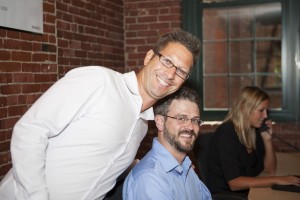 Body language is considered very important by some, but totally disregarded by others. For its proponents, it’s an important element of modern communication and engagement. For its detractors it’s a statement of the obvious and a waste of time. Yet when it comes to being interviewed at RGU (other universities are available!) we politely suggest that you should, at least, be aware of the basics.
Body language is considered very important by some, but totally disregarded by others. For its proponents, it’s an important element of modern communication and engagement. For its detractors it’s a statement of the obvious and a waste of time. Yet when it comes to being interviewed at RGU (other universities are available!) we politely suggest that you should, at least, be aware of the basics.
A lot of people who come for interviews, whether with us or any other employer, are, understandably, nervous. While it’s easy for us to say (or rather write) this, please don’t be! We are a) nice people and b) want you to present yourself as well as you can. After all, we want to recruit the best possible person for every vacancy we have.
That said, it’s obvious to us that when the person opposite is sitting with their arms folded and their body curled into a tight knot they are probably feeling very defensive and struggling to get relaxed. Similarly, if you are staring out of the window as we ask questions, you’re probably not giving the right impression.
The reality is, as any good salesperson knows, “people buy people”. So, if you do want to impress us get the aforementioned basics right. Smile, engage with everyone you meet, look at the person who has asked a question as you answer it, register “openness”, “friendliness” and “interest” and you will be halfway there. We know this may sound condescending, but you’d be amazed at how many interviewees get off on the wrong foot, sitting down before being asked, scowling at questions they don’t like, focusing on one (often male!) member of an interview panel whom they hope will be the key decision maker, wearing “inappropriate” clothing or even chewing gum or bringing a coffee into the interview with them without asking if that’s OK.
Be aware that every aspect of body language, not just its physical manifestations, can be important. These include aural, optical and oral engagement and, crucially, you must have the self-awareness (i.e. not be David Brent!) to see how your interviewers respond and where necessary, to change the way you communicate with them as a result. Body language is not the be-all and end-all though. You need to demonstrate that you’ve done your homework, that you really do want the job and have the necessary skills and experience. It’s also usually important to show us you can bring short and long-term benefits to RGU. Remember, we want everyone to present themselves brilliantly and demonstrate that we have a high calibre shortlist of candidates.
We know some people are naturals when it comes to a relaxed demeanour and engaging body language, but it’s not difficult for everyone else to be aware of the basics and get them right. We look forward to seeing you – looking relaxed and confident!
Julie Skinner, Resourcing & Benefit Specialist
Email: j.skinner@rgu.ac.uk
